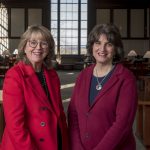The University of Connecticut has accepted an invitation to become part of the BOLD Women’s Leadership Network. The BOLD program seeks to equip young women at select universities nationwide to be innovative agents of change, both during their college careers and after they complete their studies.
“Women bring a different voice and a different concern for what’s in the best interest of the planet, in the best interest of peace, and in the best interest of work that makes a positive difference,” says Sally Reis.
Many studies have found a positive impact on black students from having black teachers in elementary and secondary schools. A new working paper from the National Bureau of Economic Research finds that the positive impact may extend far beyond school, to whether black students enroll in college.
“The time itself doesn’t matter nearly as much as what you do with that time,” says Megan Staples. “You have just opened up space for a broader range of pedagogical strategies and innovation. … It opens up space for guest speakers, it opens up space to not be rushed through your curriculum.”
“The authors describe how a “bubble” happens, how certain populations are targeted, how they clamor to get in to what appears to be a good deal, then stampede out when the bubble bursts. This may be happening now in urban African American communities,” writes Ravitch. “This article is worth your time.”
The field of education has been going through constant evaluation and evolution since 1983, when “A Nation At Risk” was published.
“That report sounded the alarm that the United States was not at the top of the food chain anymore when it comes to education,” says Richard Gonzales, director of UConn’s Neag School of Education leadership preparation program.
Since then, responses to the report have encompassed curriculum changes and standards, teacher preparation, and in the early 2000s, a growing emphasis on leadership – in particular the role and training of school principals.
UConn is now one of seven universities that are part of The Wallace Foundation’s University Principal Preparation Initiative, a four-year, $48.5-million program aimed at improving training for aspiring administrators. The Foundation encourages administrator training that emphasizes the practical aspects of the job and includes instructors who have been school leaders themselves.
UConn researchers are developing an immersive learning experience using virtual reality (VR) and game design to bring to life archival materials from the Nuremberg Trials.
UConn researchers are developing an immersive learning experience using virtual reality (VR) and game design to bring to life archival materials from the Nuremberg Trials.
UConn researchers are developing an immersive learning experience using virtual reality (VR) and game design to bring to life archival materials from the Nuremberg Trials.





